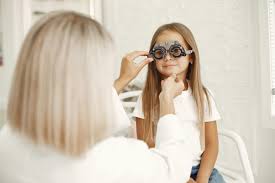
17 Sep Finding the Right Eye Doctor for Pediatric Patients
Choosing the right eye doctor for pediatric patients is a critical step in ensuring optimal visual health and development. Children require specialized eye care tailored to their unique needs, as their vision is in a continuous state of growth and adaptation. Early detection and treatment of vision problems can significantly impact a child’s overall well-being, including their academic performance and daily activities. Here is more information on selecting a pediatric eye doctor, emphasizing the importance of expertise, experience, and a child-friendly approach to care:
Differentiating Eye Care Specialists
Finding an eye doctor for your child is a key step to enabling their vision health. The initial step involves understanding the distinctions between optometrists and ophthalmologists. An optometrist is a Doctor of Optometry (OD) who conducts eye examinations, tests vision, and prescribes corrective eyewear. They diagnose and manage many eye conditions. An ophthalmologist is a medical doctor (MD) or a doctor of osteopathic medicine (DO) specializing in comprehensive eye care.
They perform all the functions of an optometrist and are also licensed to practice medicine and surgery. Some ophthalmologists pursue further specialization in pediatrics, focusing on children’s eye health. For a child over eight, either professional can typically provide routine eye care, but an ophthalmologist may be recommended for more complex conditions.
Assessing a Practice for Older Children
When looking for an eye doctor, identify practices that accommodate the needs of school-aged children. A suitable office environment will be professional and efficient. The staff should be skilled in communicating with older children, explaining procedures in terms they can understand.
The eye doctor should engage directly with the child, asking them questions about their vision at school and during activities. This approach fosters a sense of responsibility in the child regarding their own eye health. The practice should also possess up-to-date diagnostic equipment capable of performing comprehensive vision assessments for this age group, including tests for visual acuity and eye alignment that relate to academic performance.
Communicating Your Child’s Needs
A productive eye examination depends on effective communication. Before the appointment, discuss any vision-related challenges with your child. Ask if they experience difficulty seeing the board in class, headaches after reading, or problems with digital screens. Compile this information along with any family history of eye conditions. During the visit, present these points to the doctor.
Encourage your child to describe their own experiences, ask questions, and be open with their doctor. This collaborative approach allows the eye care professional to gain a full picture of the child’s daily visual demands and any potential issues. This informs the examination and any subsequent recommendations.
Find an Eye Doctor
Finding a suitable eye doctor for a child over eight is a structured process. It begins with understanding the roles of optometrists and ophthalmologists. Next, you evaluate practices to find one that effectively engages with school-aged children. Finally, you prepare for the appointment by gathering information and facilitating open communication between your child and the provider. This methodical approach helps parents make an informed choice for their child’s vision care.

No Comments